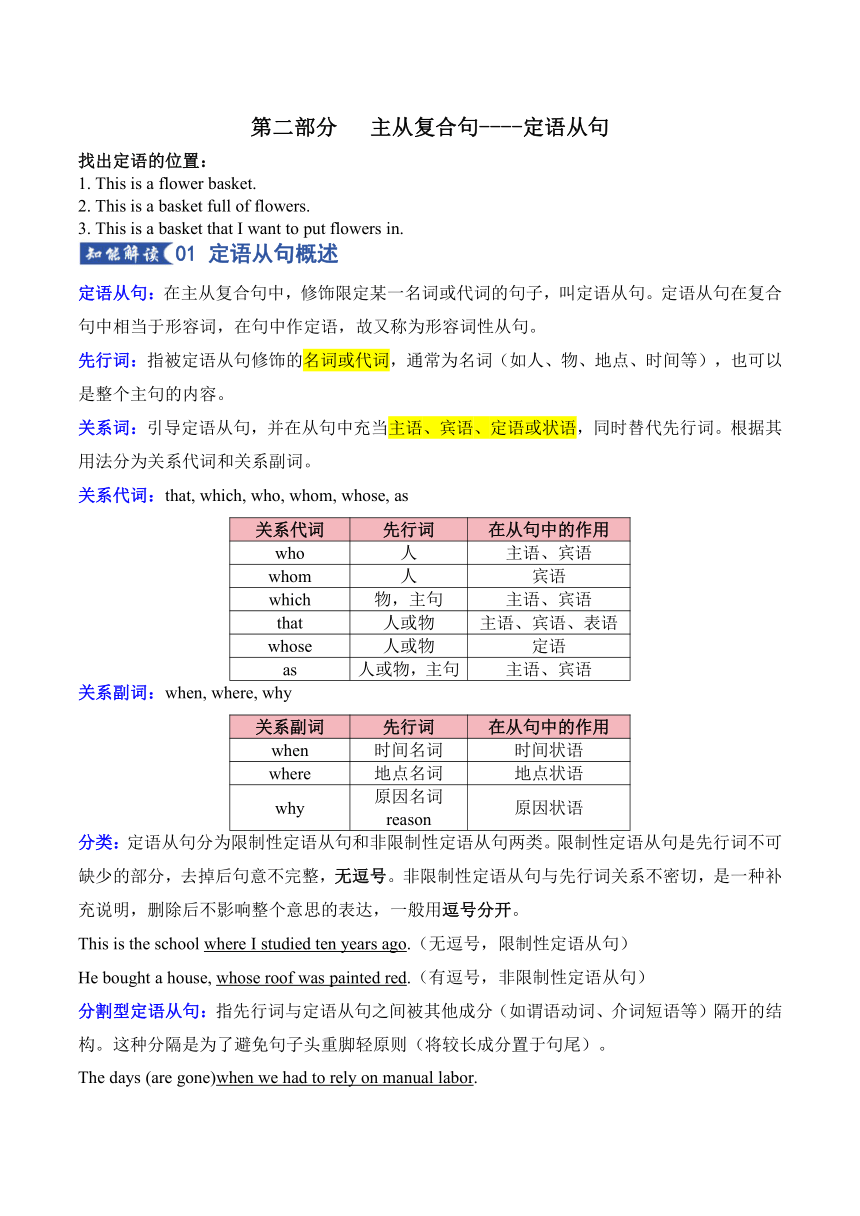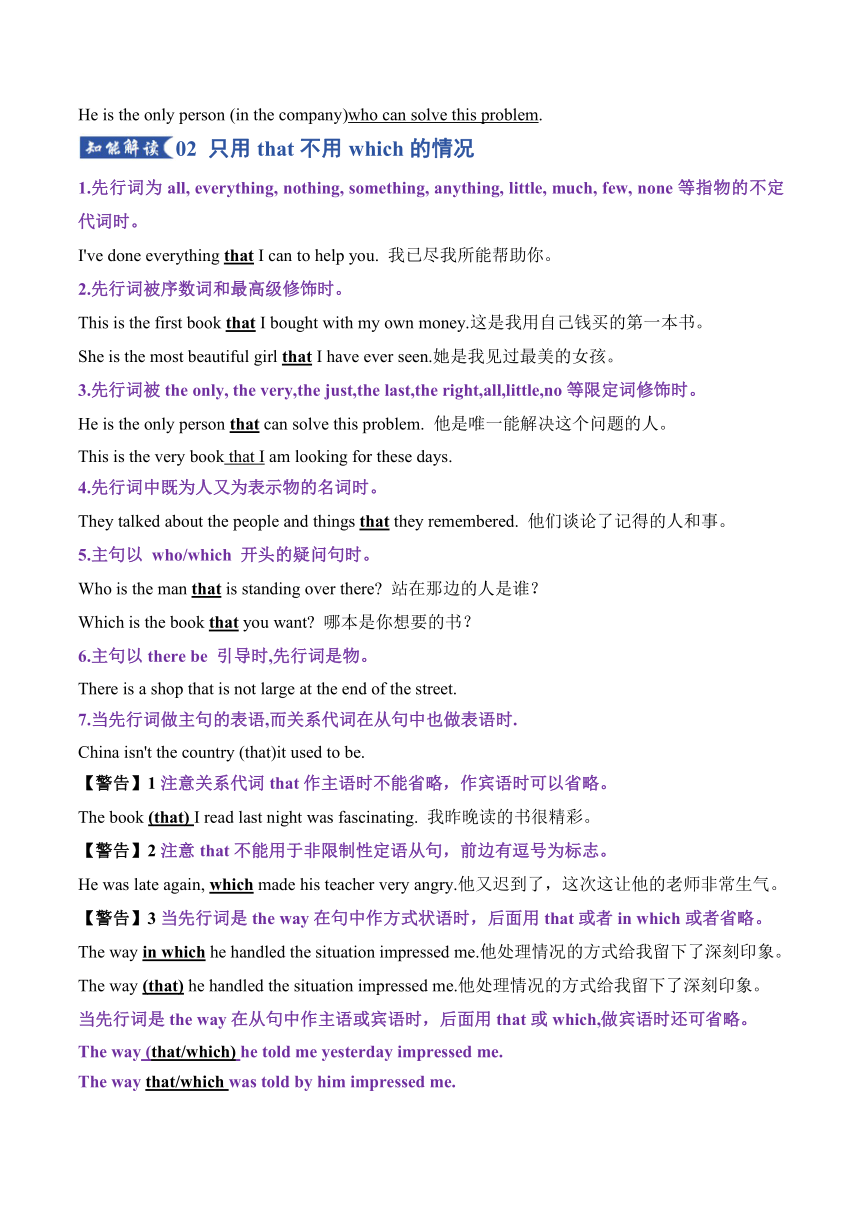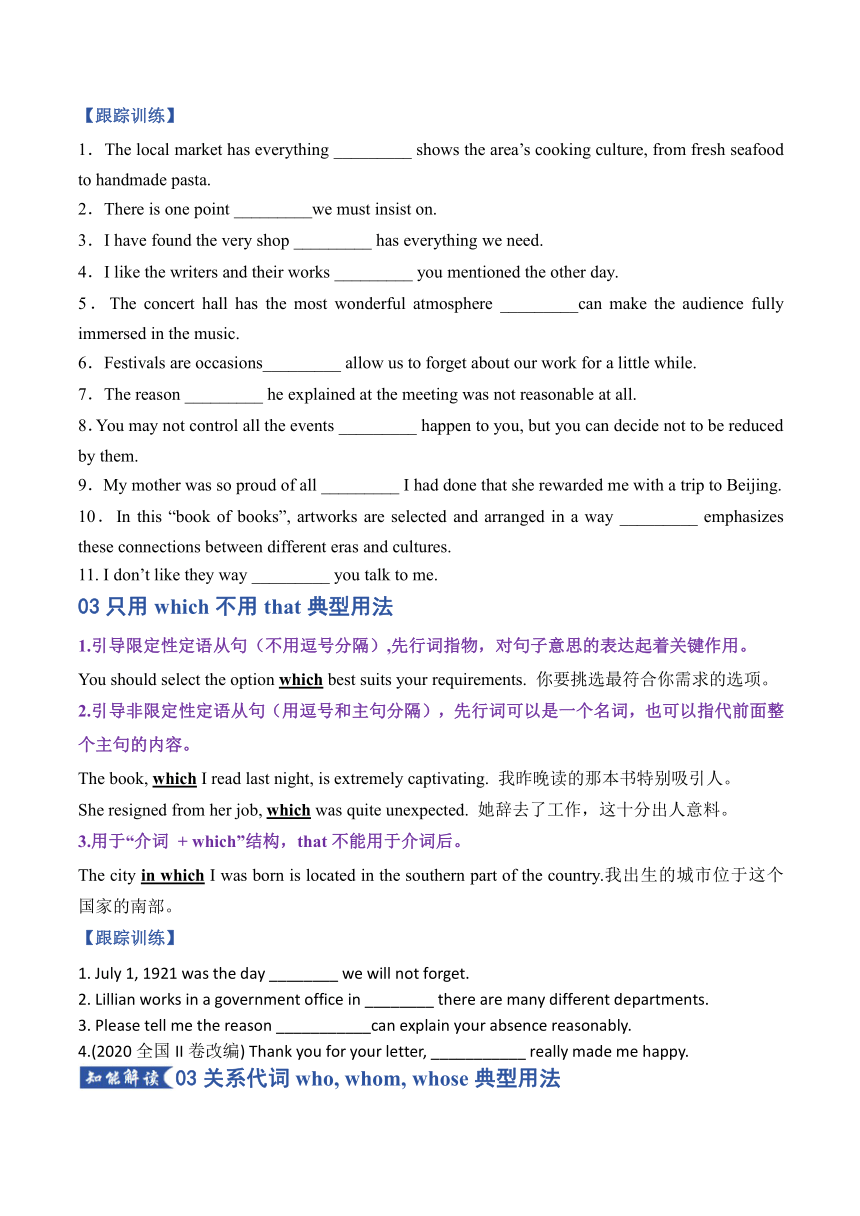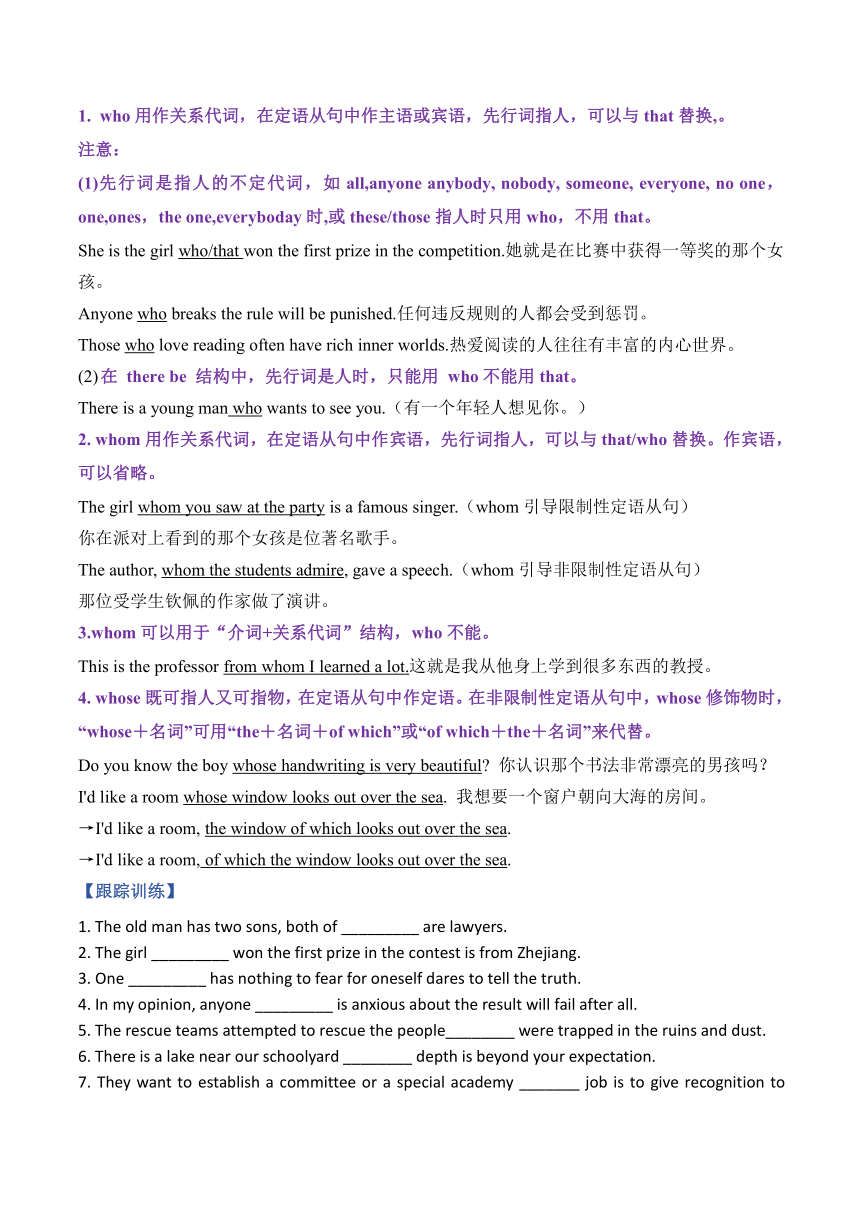第2部分复合句-定语从句 导学案(无答案(-2026届高三英语上学期一轮复习专项
文档属性
| 名称 | 第2部分复合句-定语从句 导学案(无答案(-2026届高三英语上学期一轮复习专项 |

|
|
| 格式 | docx | ||
| 文件大小 | 54.0KB | ||
| 资源类型 | 教案 | ||
| 版本资源 | 人教版(2019) | ||
| 科目 | 英语 | ||
| 更新时间 | 2025-07-19 00:00:00 | ||
图片预览




文档简介
主从复合句----定语从句
找出定语的位置:
1. This is a flower basket.
2. This is a basket full of flowers.
3. This is a basket that I want to put flowers in.
01 定语从句概述
定语从句:在主从复合句中,修饰限定某一名词或代词的句子,叫定语从句。定语从句在复合句中相当于形容词,在句中作定语,故又称为形容词性从句。
先行词:指被定语从句修饰的名词或代词,通常为名词(如人、物、地点、时间等),也可以是整个主句的内容。
关系词:引导定语从句,并在从句中充当主语、宾语、定语或状语,同时替代先行词。根据其用法分为关系代词和关系副词。
关系代词:that, which, who, whom, whose, as
关系代词 先行词 在从句中的作用
who 人 主语、宾语
whom 人 宾语
which 物,主句 主语、宾语
that 人或物 主语、宾语、表语
whose 人或物 定语
as 人或物,主句 主语、宾语
关系副词:when, where, why
关系副词 先行词 在从句中的作用
when 时间名词 时间状语
where 地点名词 地点状语
why 原因名词reason 原因状语
分类:定语从句分为限制性定语从句和非限制性定语从句两类。限制性定语从句是先行词不可缺少的部分,去掉后句意不完整,无逗号。非限制性定语从句与先行词关系不密切,是一种补充说明,删除后不影响整个意思的表达,一般用逗号分开。
This is the school where I studied ten years ago.(无逗号,限制性定语从句)
He bought a house, whose roof was painted red.(有逗号,非限制性定语从句)
分割型定语从句:指先行词与定语从句之间被其他成分(如谓语动词、介词短语等)隔开的结构。这种分隔是为了避免句子头重脚轻原则(将较长成分置于句尾)。
The days (are gone)when we had to rely on manual labor.
He is the only person (in the company)who can solve this problem.
02 只用that不用which的情况
1.先行词为all, everything, nothing, something, anything, little, much, few, none等指物的不定代词时。
I've done everything that I can to help you. 我已尽我所能帮助你。
2.先行词被序数词和最高级修饰时。
This is the first book that I bought with my own money.这是我用自己钱买的第一本书。
She is the most beautiful girl that I have ever seen.她是我见过最美的女孩。
3.先行词被the only, the very,the just,the last,the right,all,little,no等限定词修饰时。
He is the only person that can solve this problem. 他是唯一能解决这个问题的人。
This is the very book that I am looking for these days.
4.先行词中既为人又为表示物的名词时。
They talked about the people and things that they remembered. 他们谈论了记得的人和事。
5.主句以 who/which 开头的疑问句时。
Who is the man that is standing over there 站在那边的人是谁?
Which is the book that you want 哪本是你想要的书?
6.主句以there be 引导时,先行词是物。
There is a shop that is not large at the end of the street.
7.当先行词做主句的表语,而关系代词在从句中也做表语时.
China isn't the country (that)it used to be.
【警告】1注意关系代词that作主语时不能省略,作宾语时可以省略。
The book (that) I read last night was fascinating. 我昨晚读的书很精彩。
【警告】2注意that不能用于非限制性定语从句,前边有逗号为标志。
He was late again, which made his teacher very angry.他又迟到了,这次这让他的老师非常生气。
【警告】3当先行词是the way在句中作方式状语时,后面用that或者in which或者省略。
The way in which he handled the situation impressed me.他处理情况的方式给我留下了深刻印象。
The way (that) he handled the situation impressed me.他处理情况的方式给我留下了深刻印象。
当先行词是the way在从句中作主语或宾语时,后面用that或which,做宾语时还可省略。
The way (that/which) he told me yesterday impressed me.
The way that/which was told by him impressed me.
【跟踪训练】
1.The local market has everything _________ shows the area’s cooking culture, from fresh seafood to handmade pasta.
2.There is one point _________we must insist on.
3.I have found the very shop _________ has everything we need.
4.I like the writers and their works _________ you mentioned the other day.
5.The concert hall has the most wonderful atmosphere _________can make the audience fully immersed in the music.
6.Festivals are occasions_________ allow us to forget about our work for a little while.
7.The reason _________ he explained at the meeting was not reasonable at all.
8.You may not control all the events _________ happen to you, but you can decide not to be reduced by them.
9.My mother was so proud of all _________ I had done that she rewarded me with a trip to Beijing.
10.In this “book of books”, artworks are selected and arranged in a way _________ emphasizes these connections between different eras and cultures.
11. I don’t like they way _________ you talk to me.
03只用which不用that典型用法
1.引导限定性定语从句(不用逗号分隔),先行词指物,对句子意思的表达起着关键作用。
You should select the option which best suits your requirements. 你要挑选最符合你需求的选项。
2.引导非限定性定语从句(用逗号和主句分隔),先行词可以是一个名词,也可以指代前面整个主句的内容。
The book, which I read last night, is extremely captivating. 我昨晚读的那本书特别吸引人。
She resigned from her job, which was quite unexpected. 她辞去了工作,这十分出人意料。
3.用于“介词 + which”结构,that不能用于介词后。
The city in which I was born is located in the southern part of the country.我出生的城市位于这个国家的南部。
【跟踪训练】
1. July 1, 1921 was the day ________ we will not forget.
2. Lillian works in a government office in ________ there are many different departments.
3. Please tell me the reason ___________can explain your absence reasonably.
4.(2020全国II卷改编) Thank you for your letter, ___________ really made me happy.
03关系代词who, whom, whose典型用法
who用作关系代词,在定语从句中作主语或宾语,先行词指人,可以与that替换,。
注意:
(1)先行词是指人的不定代词,如all,anyone anybody, nobody, someone, everyone, no one, one,ones,the one,everyboday时,或these/those指人时只用who,不用that。
She is the girl who/that won the first prize in the competition.她就是在比赛中获得一等奖的那个女孩。
Anyone who breaks the rule will be punished.任何违反规则的人都会受到惩罚。
Those who love reading often have rich inner worlds.热爱阅读的人往往有丰富的内心世界。
在 there be 结构中,先行词是人时,只能用 who不能用that。
There is a young man who wants to see you.(有一个年轻人想见你。)
2. whom用作关系代词,在定语从句中作宾语,先行词指人,可以与that/who替换。作宾语,可以省略。
The girl whom you saw at the party is a famous singer.(whom引导限制性定语从句)
你在派对上看到的那个女孩是位著名歌手。
The author, whom the students admire, gave a speech.(whom引导非限制性定语从句)
那位受学生钦佩的作家做了演讲。
3.whom可以用于“介词+关系代词”结构,who不能。
This is the professor from whom I learned a lot.这就是我从他身上学到很多东西的教授。
4. whose既可指人又可指物,在定语从句中作定语。在非限制性定语从句中,whose修饰物时,“whose+名词”可用“the+名词+of which”或“of which+the+名词”来代替。
Do you know the boy whose handwriting is very beautiful 你认识那个书法非常漂亮的男孩吗?
I'd like a room whose window looks out over the sea. 我想要一个窗户朝向大海的房间。
→I'd like a room, the window of which looks out over the sea.
→I'd like a room, of which the window looks out over the sea.
【跟踪训练】
1. The old man has two sons, both of _________ are lawyers.
2. The girl _________ won the first prize in the contest is from Zhejiang.
3. One _________ has nothing to fear for oneself dares to tell the truth.
4. In my opinion, anyone _________ is anxious about the result will fail after all.
5. The rescue teams attempted to rescue the people________ were trapped in the ruins and dust.
6. There is a lake near our schoolyard ________ depth is beyond your expectation.
7. They want to establish a committee or a special academy _______ job is to give recognition to new drugs.
8. An idiom is a group of words _________ meaning is different from the meanings of the individual words.
9.Some people think that the great Chinese scholar Confucius, __________lived from roughly 551 to 479 B.C., influenced the development of chopsticks.
10.The woman __________you saw just now is our English teacher.
04关系代词as的典型用法
1. as引导限制性定语从句的用法
as用作关系代词,引导限制性定语从句,作从句的主语、宾语或表语,as不可省略,用于such…as…, so…as…, the same…as…句型。
Don’t trust such people as praise you to your face.不要相信当面表扬你的这种人。
They have never read so many books as I read last year. 他们从来都没有读过像我去年读过的那些书。
★易错提醒1:the same…as…强调“和……是同一类”;the same…that…强调“和……是同一个”。
This is the same dictionary as I lost yesterday. 这本词典和我昨天丢的那本一样。(不是同一本词典)
He is the same boy that helped me yesterday. 他是昨天帮过我的那个男孩。(指同一个男孩)
★易错提醒2:so…that…, such…that…引导结果状语从句,that只起连接作用不作句子成分。
She is such a kind girl that many students like her.
她是个善良的女孩所以很多学生喜欢她。(状语从句是完整的,前面的that只起引导作用,不作成分。)
She is such a kind girl as many students like.
她是个善良的女孩所以很多学生喜欢她。(定语从句缺少宾语,前面的as代替先行词girl,作宾语。)
【跟踪训练】在空白处填入1个适当的单词。
1. Los Angeles is such an attractive place _______everyone likes to visit.
2. Los Angeles is such an attractive place _______everyone likes to visit it.
3. This is ______difficult a problem _____no one can work out.
4. This is ______difficult a problem _____no one can work it out.
5. My pen is missing. I’d like to buy the same pen _______I lost.
6. Jenny is so happy, for she has found the same pen ______ she lost yesterday.
2. as引导非限制性定语从句的用法
as用作关系代词,引导非限制性定语从;as从句位于主句的前、中、后,强调前后逻辑一致,表示“正如……;从句多含有see, know, expect, tell, report等动词。
As is known to all, Taiwan belongs to China.
众所周知,台湾属于中国。(as引导非限制性定语从句且位于句首)
Taiwan, as is known to all, belongs to China.
众所周知,台湾属于中国。(as引导非限制性定语从句且位于句中)
She has married again, as was expected.
不出所料,她又结婚了。(as引导非限制性定语从句且位于句末)
★易错提醒:which和as引导非限制性定语从句用法区别:
①位置上:which从句只能位于主句之后,as从句位于主句的前、中、后;
②意思上:which意思是“这,这一点”;as意思,“正如”;
③指代上:as在非限制性定语从句中只能指代主句整个句子,which既可以指代主句也可以指代主句里的一个名词或代词。
As is often the case, girls like dolls while boys like guns. 女孩子喜欢玩具而男孩子喜欢枪,正如经常发生的那样
He sold his new car, which made me surprised. 他把他的新车车卖掉了,这让我很吃惊。
He sold his new car, which was bought last year. 他把他的新车卖掉了,这个车是去年买的。
【跟踪训练】在空白处填入1个适当的单词。
1.(2023全国甲卷)Yet, the form of the fable still has values today, _________Rachel Carson says in “A Fable for Tomorrow”.
2.After reading this novel, we were all impressed by such integrity _________was shown by the leading character.
3.The teacher asked such a difficult question _________ no one could answer.
4.Last week our maths teacher set so difficult an examination problem _________ none of us worked it out.
5. _________the book mentions, you had better not do such things _________ you are unsure about.
6.I worked at a panda conservation center in China, _________ saw a significant increase in panda population numbers.
7.People from the UK are called “British”, _________ means the UK is also often referred to as Britain or Great Britain.
05关系副词when, where, why典型用法
1. when用作关系副词,在定语从句作时间状语。其先行词是具体时间名词,如day, month, year;还可以是抽象名词,如age, stay, occasion等。=介词+which
Do you remember the day when we first met
你还记得我们第一次见面的那一天吗?(定语从句是主谓结构,不缺少宾语)
There are occasions when one must yield.
任何人都有不得不屈服的时候。(先行词occasions是典型时间名词)
★易错提醒:
当 time 表示“次数”时,用 that 引导从句(可省略);当 time 表示“时间”时,用 when 引导从句。
This is the first time that I’ve heard this song.
I’ll never forget the time when we worked together in the village.
2. where用作关系副词,在定语从句作地点状语=介词+which。注意定语从句可能是主谓结构或主谓宾结构。其先行词既可以是具体地点名词,如school, museum, centre;还可以是抽象名词,如point, case, situation, stage, race, position, job等(热点,须牢记)。
This is the hospital where my sister used to work.
The shop where I bought this shirt is not far from here.
我买这件衬衫的商店离这里不远。(定语从句是主谓宾结构,不缺少宾语)
There are many cases where this rule doesn’t apply.
在许多情况下,这条规则不适用。(先行词cases是抽象地点)
why用作关系副词,先行词是reason在定语从句作原因状语=for which。why还可以用于The reason why…is that…句型。
注意:(1)非限制性定语从句不能用why,只能用for which.
(2)如果先行词是reason但在定语从句中做主语或宾语,则用关系代词that或which。
The reason why he is late is that he failed to catch the first bus.
他迟到的原因是他没能赶上第一班公共汽车。(关系词在从句中作状语)
The reason that he gave is that he failed to catch the first bus.
他给出的原因是他没能赶上第一班公共汽车。(关系词在从句中作宾语)
【跟踪训练】
1.(2023全国甲卷)“There was once a town in the heart of America, _________ all life seemed to enjoy peaceful existence with is surroundings,” her fable begins, borrowing some familiar words from many age-old fables.
2.(2021天津卷)At the Chinese art festival, there are different stands _________ artists demonstrate their skills and teach the visitors.
3.Attending the charity event was an occasion __________I realized the importance of giving back to the community.
4.The reason __________ we should reduce plastic use is that it significantly reduces pollution and protects marine life. 5
5..I will go sightseeing in Beijing with my parents in September, __________ the weather is neither too hot nor too cold.
01 关系代词和关系副词混淆
1.先行词是地点名词,关系词不一定用where;先行词是时间名词,关系词不一定用when;先行词是原因名词,关系词不一定用why。
2.窍门:关系代词在定语从句中作主语、宾语等;关系副词代替表示时间、地点、原因的先行词,并在定语从句中作时间、地点和原因状语。
★易错提醒:学会分析句子成分,原句含有主谓宾或者不缺少宾语才能用关系副词;原句缺少主语或宾语用关系代词。
I remember the year _________he was born.
I remember the year_________saw great changes.
This is the park _________ we had a picnic.
This is the park _________ we visited.
The reason _________ he left is still unknown.
The reason _________he gave for being late was acceptable.
1.He often recalls his childhood, ___________he lived with his grandparents in the countryside.
2.The author ___________ whom all of us are familiar will visit our company.
3.In a word, we reached a point___________ we wish to enjoy and understand literature.
4.Asians ___________ diets are like Westerners’ experience more disease and weight problems.
5.The reason ___________ we should reduce plastic use is that it significantly reduces pollution and protects marine life.
6.She often reminds herself of the good days ___________they spent together working out the problem in the distant rural area.
7.It’s the only Thai restaurant ___________ ranks among the top 10 of the world’s 50 best restaurants list.
8.The app uses AR to transform the way ___________ visitors interact with the park’s wildlife.
9.The students benefiting most from college are those ___________ are totally engaged in academic life.
11.I don’t think the number of the people to ___________ this happens is very large.
12. He was often late, __________ made his teacher very angry.
找出定语的位置:
1. This is a flower basket.
2. This is a basket full of flowers.
3. This is a basket that I want to put flowers in.
01 定语从句概述
定语从句:在主从复合句中,修饰限定某一名词或代词的句子,叫定语从句。定语从句在复合句中相当于形容词,在句中作定语,故又称为形容词性从句。
先行词:指被定语从句修饰的名词或代词,通常为名词(如人、物、地点、时间等),也可以是整个主句的内容。
关系词:引导定语从句,并在从句中充当主语、宾语、定语或状语,同时替代先行词。根据其用法分为关系代词和关系副词。
关系代词:that, which, who, whom, whose, as
关系代词 先行词 在从句中的作用
who 人 主语、宾语
whom 人 宾语
which 物,主句 主语、宾语
that 人或物 主语、宾语、表语
whose 人或物 定语
as 人或物,主句 主语、宾语
关系副词:when, where, why
关系副词 先行词 在从句中的作用
when 时间名词 时间状语
where 地点名词 地点状语
why 原因名词reason 原因状语
分类:定语从句分为限制性定语从句和非限制性定语从句两类。限制性定语从句是先行词不可缺少的部分,去掉后句意不完整,无逗号。非限制性定语从句与先行词关系不密切,是一种补充说明,删除后不影响整个意思的表达,一般用逗号分开。
This is the school where I studied ten years ago.(无逗号,限制性定语从句)
He bought a house, whose roof was painted red.(有逗号,非限制性定语从句)
分割型定语从句:指先行词与定语从句之间被其他成分(如谓语动词、介词短语等)隔开的结构。这种分隔是为了避免句子头重脚轻原则(将较长成分置于句尾)。
The days (are gone)when we had to rely on manual labor.
He is the only person (in the company)who can solve this problem.
02 只用that不用which的情况
1.先行词为all, everything, nothing, something, anything, little, much, few, none等指物的不定代词时。
I've done everything that I can to help you. 我已尽我所能帮助你。
2.先行词被序数词和最高级修饰时。
This is the first book that I bought with my own money.这是我用自己钱买的第一本书。
She is the most beautiful girl that I have ever seen.她是我见过最美的女孩。
3.先行词被the only, the very,the just,the last,the right,all,little,no等限定词修饰时。
He is the only person that can solve this problem. 他是唯一能解决这个问题的人。
This is the very book that I am looking for these days.
4.先行词中既为人又为表示物的名词时。
They talked about the people and things that they remembered. 他们谈论了记得的人和事。
5.主句以 who/which 开头的疑问句时。
Who is the man that is standing over there 站在那边的人是谁?
Which is the book that you want 哪本是你想要的书?
6.主句以there be 引导时,先行词是物。
There is a shop that is not large at the end of the street.
7.当先行词做主句的表语,而关系代词在从句中也做表语时.
China isn't the country (that)it used to be.
【警告】1注意关系代词that作主语时不能省略,作宾语时可以省略。
The book (that) I read last night was fascinating. 我昨晚读的书很精彩。
【警告】2注意that不能用于非限制性定语从句,前边有逗号为标志。
He was late again, which made his teacher very angry.他又迟到了,这次这让他的老师非常生气。
【警告】3当先行词是the way在句中作方式状语时,后面用that或者in which或者省略。
The way in which he handled the situation impressed me.他处理情况的方式给我留下了深刻印象。
The way (that) he handled the situation impressed me.他处理情况的方式给我留下了深刻印象。
当先行词是the way在从句中作主语或宾语时,后面用that或which,做宾语时还可省略。
The way (that/which) he told me yesterday impressed me.
The way that/which was told by him impressed me.
【跟踪训练】
1.The local market has everything _________ shows the area’s cooking culture, from fresh seafood to handmade pasta.
2.There is one point _________we must insist on.
3.I have found the very shop _________ has everything we need.
4.I like the writers and their works _________ you mentioned the other day.
5.The concert hall has the most wonderful atmosphere _________can make the audience fully immersed in the music.
6.Festivals are occasions_________ allow us to forget about our work for a little while.
7.The reason _________ he explained at the meeting was not reasonable at all.
8.You may not control all the events _________ happen to you, but you can decide not to be reduced by them.
9.My mother was so proud of all _________ I had done that she rewarded me with a trip to Beijing.
10.In this “book of books”, artworks are selected and arranged in a way _________ emphasizes these connections between different eras and cultures.
11. I don’t like they way _________ you talk to me.
03只用which不用that典型用法
1.引导限定性定语从句(不用逗号分隔),先行词指物,对句子意思的表达起着关键作用。
You should select the option which best suits your requirements. 你要挑选最符合你需求的选项。
2.引导非限定性定语从句(用逗号和主句分隔),先行词可以是一个名词,也可以指代前面整个主句的内容。
The book, which I read last night, is extremely captivating. 我昨晚读的那本书特别吸引人。
She resigned from her job, which was quite unexpected. 她辞去了工作,这十分出人意料。
3.用于“介词 + which”结构,that不能用于介词后。
The city in which I was born is located in the southern part of the country.我出生的城市位于这个国家的南部。
【跟踪训练】
1. July 1, 1921 was the day ________ we will not forget.
2. Lillian works in a government office in ________ there are many different departments.
3. Please tell me the reason ___________can explain your absence reasonably.
4.(2020全国II卷改编) Thank you for your letter, ___________ really made me happy.
03关系代词who, whom, whose典型用法
who用作关系代词,在定语从句中作主语或宾语,先行词指人,可以与that替换,。
注意:
(1)先行词是指人的不定代词,如all,anyone anybody, nobody, someone, everyone, no one, one,ones,the one,everyboday时,或these/those指人时只用who,不用that。
She is the girl who/that won the first prize in the competition.她就是在比赛中获得一等奖的那个女孩。
Anyone who breaks the rule will be punished.任何违反规则的人都会受到惩罚。
Those who love reading often have rich inner worlds.热爱阅读的人往往有丰富的内心世界。
在 there be 结构中,先行词是人时,只能用 who不能用that。
There is a young man who wants to see you.(有一个年轻人想见你。)
2. whom用作关系代词,在定语从句中作宾语,先行词指人,可以与that/who替换。作宾语,可以省略。
The girl whom you saw at the party is a famous singer.(whom引导限制性定语从句)
你在派对上看到的那个女孩是位著名歌手。
The author, whom the students admire, gave a speech.(whom引导非限制性定语从句)
那位受学生钦佩的作家做了演讲。
3.whom可以用于“介词+关系代词”结构,who不能。
This is the professor from whom I learned a lot.这就是我从他身上学到很多东西的教授。
4. whose既可指人又可指物,在定语从句中作定语。在非限制性定语从句中,whose修饰物时,“whose+名词”可用“the+名词+of which”或“of which+the+名词”来代替。
Do you know the boy whose handwriting is very beautiful 你认识那个书法非常漂亮的男孩吗?
I'd like a room whose window looks out over the sea. 我想要一个窗户朝向大海的房间。
→I'd like a room, the window of which looks out over the sea.
→I'd like a room, of which the window looks out over the sea.
【跟踪训练】
1. The old man has two sons, both of _________ are lawyers.
2. The girl _________ won the first prize in the contest is from Zhejiang.
3. One _________ has nothing to fear for oneself dares to tell the truth.
4. In my opinion, anyone _________ is anxious about the result will fail after all.
5. The rescue teams attempted to rescue the people________ were trapped in the ruins and dust.
6. There is a lake near our schoolyard ________ depth is beyond your expectation.
7. They want to establish a committee or a special academy _______ job is to give recognition to new drugs.
8. An idiom is a group of words _________ meaning is different from the meanings of the individual words.
9.Some people think that the great Chinese scholar Confucius, __________lived from roughly 551 to 479 B.C., influenced the development of chopsticks.
10.The woman __________you saw just now is our English teacher.
04关系代词as的典型用法
1. as引导限制性定语从句的用法
as用作关系代词,引导限制性定语从句,作从句的主语、宾语或表语,as不可省略,用于such…as…, so…as…, the same…as…句型。
Don’t trust such people as praise you to your face.不要相信当面表扬你的这种人。
They have never read so many books as I read last year. 他们从来都没有读过像我去年读过的那些书。
★易错提醒1:the same…as…强调“和……是同一类”;the same…that…强调“和……是同一个”。
This is the same dictionary as I lost yesterday. 这本词典和我昨天丢的那本一样。(不是同一本词典)
He is the same boy that helped me yesterday. 他是昨天帮过我的那个男孩。(指同一个男孩)
★易错提醒2:so…that…, such…that…引导结果状语从句,that只起连接作用不作句子成分。
She is such a kind girl that many students like her.
她是个善良的女孩所以很多学生喜欢她。(状语从句是完整的,前面的that只起引导作用,不作成分。)
She is such a kind girl as many students like.
她是个善良的女孩所以很多学生喜欢她。(定语从句缺少宾语,前面的as代替先行词girl,作宾语。)
【跟踪训练】在空白处填入1个适当的单词。
1. Los Angeles is such an attractive place _______everyone likes to visit.
2. Los Angeles is such an attractive place _______everyone likes to visit it.
3. This is ______difficult a problem _____no one can work out.
4. This is ______difficult a problem _____no one can work it out.
5. My pen is missing. I’d like to buy the same pen _______I lost.
6. Jenny is so happy, for she has found the same pen ______ she lost yesterday.
2. as引导非限制性定语从句的用法
as用作关系代词,引导非限制性定语从;as从句位于主句的前、中、后,强调前后逻辑一致,表示“正如……;从句多含有see, know, expect, tell, report等动词。
As is known to all, Taiwan belongs to China.
众所周知,台湾属于中国。(as引导非限制性定语从句且位于句首)
Taiwan, as is known to all, belongs to China.
众所周知,台湾属于中国。(as引导非限制性定语从句且位于句中)
She has married again, as was expected.
不出所料,她又结婚了。(as引导非限制性定语从句且位于句末)
★易错提醒:which和as引导非限制性定语从句用法区别:
①位置上:which从句只能位于主句之后,as从句位于主句的前、中、后;
②意思上:which意思是“这,这一点”;as意思,“正如”;
③指代上:as在非限制性定语从句中只能指代主句整个句子,which既可以指代主句也可以指代主句里的一个名词或代词。
As is often the case, girls like dolls while boys like guns. 女孩子喜欢玩具而男孩子喜欢枪,正如经常发生的那样
He sold his new car, which made me surprised. 他把他的新车车卖掉了,这让我很吃惊。
He sold his new car, which was bought last year. 他把他的新车卖掉了,这个车是去年买的。
【跟踪训练】在空白处填入1个适当的单词。
1.(2023全国甲卷)Yet, the form of the fable still has values today, _________Rachel Carson says in “A Fable for Tomorrow”.
2.After reading this novel, we were all impressed by such integrity _________was shown by the leading character.
3.The teacher asked such a difficult question _________ no one could answer.
4.Last week our maths teacher set so difficult an examination problem _________ none of us worked it out.
5. _________the book mentions, you had better not do such things _________ you are unsure about.
6.I worked at a panda conservation center in China, _________ saw a significant increase in panda population numbers.
7.People from the UK are called “British”, _________ means the UK is also often referred to as Britain or Great Britain.
05关系副词when, where, why典型用法
1. when用作关系副词,在定语从句作时间状语。其先行词是具体时间名词,如day, month, year;还可以是抽象名词,如age, stay, occasion等。=介词+which
Do you remember the day when we first met
你还记得我们第一次见面的那一天吗?(定语从句是主谓结构,不缺少宾语)
There are occasions when one must yield.
任何人都有不得不屈服的时候。(先行词occasions是典型时间名词)
★易错提醒:
当 time 表示“次数”时,用 that 引导从句(可省略);当 time 表示“时间”时,用 when 引导从句。
This is the first time that I’ve heard this song.
I’ll never forget the time when we worked together in the village.
2. where用作关系副词,在定语从句作地点状语=介词+which。注意定语从句可能是主谓结构或主谓宾结构。其先行词既可以是具体地点名词,如school, museum, centre;还可以是抽象名词,如point, case, situation, stage, race, position, job等(热点,须牢记)。
This is the hospital where my sister used to work.
The shop where I bought this shirt is not far from here.
我买这件衬衫的商店离这里不远。(定语从句是主谓宾结构,不缺少宾语)
There are many cases where this rule doesn’t apply.
在许多情况下,这条规则不适用。(先行词cases是抽象地点)
why用作关系副词,先行词是reason在定语从句作原因状语=for which。why还可以用于The reason why…is that…句型。
注意:(1)非限制性定语从句不能用why,只能用for which.
(2)如果先行词是reason但在定语从句中做主语或宾语,则用关系代词that或which。
The reason why he is late is that he failed to catch the first bus.
他迟到的原因是他没能赶上第一班公共汽车。(关系词在从句中作状语)
The reason that he gave is that he failed to catch the first bus.
他给出的原因是他没能赶上第一班公共汽车。(关系词在从句中作宾语)
【跟踪训练】
1.(2023全国甲卷)“There was once a town in the heart of America, _________ all life seemed to enjoy peaceful existence with is surroundings,” her fable begins, borrowing some familiar words from many age-old fables.
2.(2021天津卷)At the Chinese art festival, there are different stands _________ artists demonstrate their skills and teach the visitors.
3.Attending the charity event was an occasion __________I realized the importance of giving back to the community.
4.The reason __________ we should reduce plastic use is that it significantly reduces pollution and protects marine life. 5
5..I will go sightseeing in Beijing with my parents in September, __________ the weather is neither too hot nor too cold.
01 关系代词和关系副词混淆
1.先行词是地点名词,关系词不一定用where;先行词是时间名词,关系词不一定用when;先行词是原因名词,关系词不一定用why。
2.窍门:关系代词在定语从句中作主语、宾语等;关系副词代替表示时间、地点、原因的先行词,并在定语从句中作时间、地点和原因状语。
★易错提醒:学会分析句子成分,原句含有主谓宾或者不缺少宾语才能用关系副词;原句缺少主语或宾语用关系代词。
I remember the year _________he was born.
I remember the year_________saw great changes.
This is the park _________ we had a picnic.
This is the park _________ we visited.
The reason _________ he left is still unknown.
The reason _________he gave for being late was acceptable.
1.He often recalls his childhood, ___________he lived with his grandparents in the countryside.
2.The author ___________ whom all of us are familiar will visit our company.
3.In a word, we reached a point___________ we wish to enjoy and understand literature.
4.Asians ___________ diets are like Westerners’ experience more disease and weight problems.
5.The reason ___________ we should reduce plastic use is that it significantly reduces pollution and protects marine life.
6.She often reminds herself of the good days ___________they spent together working out the problem in the distant rural area.
7.It’s the only Thai restaurant ___________ ranks among the top 10 of the world’s 50 best restaurants list.
8.The app uses AR to transform the way ___________ visitors interact with the park’s wildlife.
9.The students benefiting most from college are those ___________ are totally engaged in academic life.
11.I don’t think the number of the people to ___________ this happens is very large.
12. He was often late, __________ made his teacher very angry.
